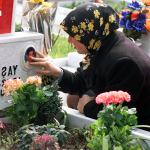February 09, 2011

Photo: Reuters
A Turkish girl cries while touching a picture of her brother on a decorated gravestone at a cemetery in Istanbul. The girl's brother was one of the Turkish soldiers who lost their lives in clashes against Kurdish rebels (File).
Excavations are continuing at two mass graves which have been discovered in the southeast of Turkey, a predominantly Kurdish southeast Turkey. The bodies are believed to be victims of Turkey's war against the Kurdish rebel group the PKK, which for decades has been fighting for greater Kurdish rights. At the height of the conflict in the 1990's, thousands of people disappeared. Their families have met a wall of silence in their struggle to find out what happened to loved ones.
Where they were found
It's grisly work excavating the earth at the two mass graves near the town of Bitlis in Turkey's predominantly Kurdish southeast. Both sites are close to a rubbish dump which was used by the local police station. So far 20 bodies have been found. The victims are believed to belong to what the Kurds simply call "the disappeared".
Ayfer's father is one of them. She's now 25 but was only 10 when she says her father was dragged from their home by soldiers in the middle of the night. Ayfer has devoted her life to finding him.
"My father does not have a grave. He's all alone. When we find him, we'll be able to dig a grave for him in a cemetery and he'll have a place in the world," she says. "It was so hard growing up not knowing where he is."
Ayer is one of thousands trying to find the remains of loved ones. Her father was a victim of the Turkish state's dirty war against the Kurdish rebel group the PKK, which has been fighting for Kurdish rights since 1984.
Rights allegations
Emma Sinclair Webb of the U.S.-based Human Rights Watch says the disappearances were part of a state policy to terrorize the local civilian population.
"In the early 90's there was a policy of rounding of hundreds and thousands of civilians, and giving no proper trial or judicial process, but rather taking them in, threatening them, torturing them. There was systematic torture throughout that period, and a lot of others simply were not heard of again and in that region thousands disappeared or bodies were found too at the time, but not identified and there was no attempt to discover how the killings took place and who by. So there is massive legacy and impunity. For the past abuses, for the disappearances and killings," Webb explains.
Observers say that dark legacy continues to remain an open wound in Turkey.
Protests and resentment
The discovery of these latest mass graves led to thousands of Kurds protesting against what they say is the government's silence over this issue. For years, the main Kurdish party has called for an investigation into the disappearances, but the authorities have dismissed this demand as terrorist propaganda. That is until now.
Sezgin Tanr?kulu a leading Kurdish lawyer and now responsible for human rights for the main opposition CHP party, says Turkey must face up to what happened during the conflict.
"What we're asking for today can put us on the road to reconciliation and achieving justice for all these unknown killings, for the Kurdish issue, for democracy," he says.
Tanr?kulu is calling for a "truth commission" to be set up by parliament, on a non-party basis. He says it should investigate unsolved political killings and cases involving missing persons that have occurred since Turkey's military coup in 1980. The ruling AK party has so far rejected such calls. But pressure is also growing from the EU, which Turkey is seeking to join.
Requested reforms
Richard Howitt, the spokesman for the European Parliament's committee on Turkey, says the government has to change its attitude. "There is still amongst the ruling class a heavy defensiveness against Kurdish rights in Ankara. And the default position of the government and those around them is simply to attack the terrorism of the PKK," he said.
The mounting pressure on the government does appear to be having an affect. Last weekend the Turkish Prime Minster Recep Tayyip Erdogan met with mothers of the disappeared in a highly publicized event. He promised to look into their individual cases, but refused calls for a parliamentary investigation.